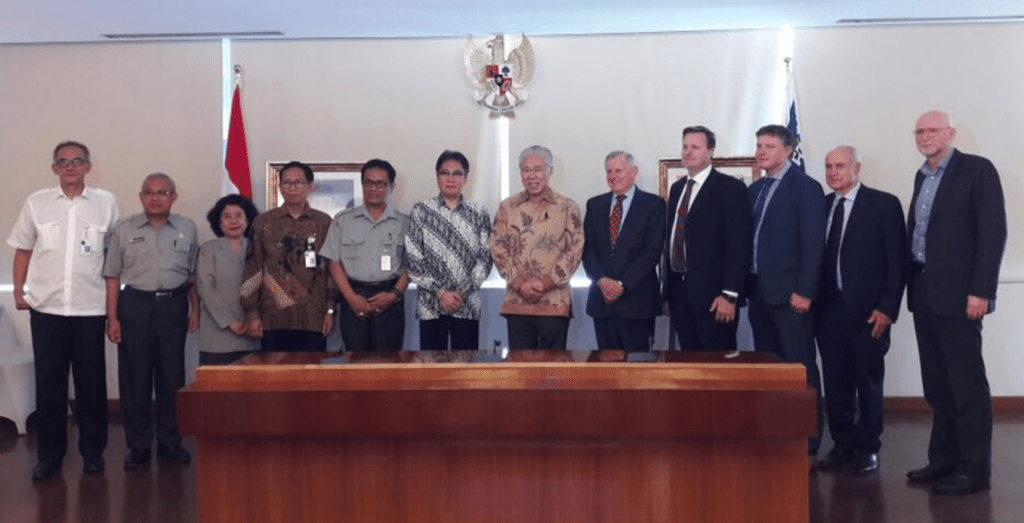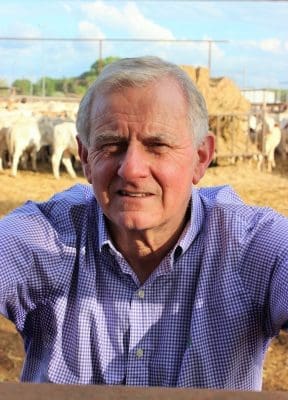
Indonesian and Australian representatives meet to discuss cattle import arrangements in Jakarta yesterday.
Cattle exports to Indonesia may be set to increase again in coming weeks with reports more Indonesian importers have now agreed to the Indonesian Government’s requirement to import one breeding female with every five head of feeder cattle.
Indonesia’s newly appointed Trade Minister Enggartiasto Lukita introduced the surprise new breeder ratio policy at the start of September.
Importers preparing to restock feedlots for the third trimester were told they would be unable to access permits for feeder cattle until they agreed to the new breeder import rule.
Confusion surrounding the policy, which was introduced verbally and not by the usual formal ministerial decree, resulted in no cattle being exported from Australia to Indonesia for the entire month of September.
A lack of written detail also resulted in mixed signals being distributed to the trade, with some bodies of Government indicating that import quotas had been fully abolished, while others stated that Indonesia would import a quota of 700,000 head in 2017.
The new policy has emerged at a time when Indonesian importers are financially stretched between having to pay record high cattle purchase prices from Australia while being required by their Governments to sell finished cattle beneath a price ceiling in order to meet its goal of keeping beef prices affordable for Indonesian consumers.
It is also a difficult and expensive policy for importers to implement. All have feedlot infrastructure, which is not conducive to successful and effective breeding of cattle, and must find some way to feed and accommodate breeding cattle for long periods from now on, if they are to continue importing the feeder cattle they need for their feedlots.
Three larger Indonesian importers – Santori, AustAsia and Great Giant Livestock – were the first to ‘sign on’ to the new breeder requirement which allowed them to recommence cattle imports from Australia and start restocking their feedlots in early October.
It is understood that about eight importers have now signed on in total, which should result in more shipments of feeder cattle resuming from Australia.
However, there are more than 30 Indonesian cattle importing businesses in total, with most still yet to formally agree to the new requirements. Many lot feeders say that being forced to fill large areas of their feedlots with breeding cattle for long periods is unviable and will effectively destroy their businesses.
There are mixed views on how the policy may play out from here.
One view is that it will create another shortage of beef in Indonesia – remembering it has already resulted in an entire month of no cattle imports to the country – which will force prices to skyrocket as demand increases ahead of Ramadan in May/June next year. The feeling is this may cause the Indonesian Government to abandon the policy before that happens, to avoid a consumer backlash.
However, other importers have the view that the Indonesia will not abandon the breeder ratio, and that the policy will have to be regarded as a new cost of doing business, as the introduction of ESCAS was five years ago.
Indonesian’s trade Minister Lukita told the Jakarta Post yesterday that Indonesia will not just rely on Australia for the cattle it needs, and will soon begin importing breeding and feeder cattle from other suppliers such as Mexico and Brazil.
A delegation of Australian Livestock Exporters’ Council representatives, including chairman Simon Crean, met with Mr Lukita and other Indonesian Government officials to discuss the breeder import policy yesterday.
Mr Crean said the trade in cattle between Australia and Indonesia had been “a partnership built on years of significant collaboration and strategic alignment”.
“The opportunity to spend time in Indonesia this week has galvanised my belief that the export of both feeder and breeder cattle from Australia to Indonesia has an economically sustainable and mutually beneficial future, which is underpinned in the long-term by our shared objectives around ongoing economic development and working cooperatively to build Indonesia’s beef and cattle capacity,” he said in a statement supplied to Beef Central.
In a press conference following the meetings Mr Crean said agreement had been reached to form a working party to “focus on initiatives to complement the significant investments already being driven by government and business to build Indonesia’s capacity”.
He said efforts to promote food security, price stability and the economic development and employment potential of the live cattle trade was a key shared objective in the relationship.
Indonesian president Joko “Jokowi” Widodo is scheduled to visit Australia next month. If the issue is not resolved by that time it is likely to again be raised during his visit.
This situation puts a higher priority on the cattle-breeding program under the Indonesia-Australia Partnership on Food Security in the Red Meat and Cattle Sector to promote sustainable commercial-scale beef cattle breeding in Indonesia.
Late last week Australian agriculture minister Barnaby Joyce announced that 300 cattle had been delivered to the first partner site in South Kalimantan under the commercial cattle breeding program.
“As demand for beef in Indonesia continues to rise, this project is one more example of Australia’s commitment to work with the Indonesian industry to increase productivity through the transfer of skills and expertise in cattle breeding.
“It will generate strong investment opportunities and establish important new markets for Australian breeding stock.”
Chairman of the Indonesia Investment Coordinating Board, Thomas Lembong – who was Mr Lukita’s predecessor as Indonesia’s Trade Minister until last month – said in the same statement that the partnership would strengthen “our already strong trade and investment relationship with Australia,” Chairman Lembong said.
The project will see Australia supply 2000 breeding heifers and 100 bulls to selected partner sites in Indonesia.
It will also provide a team of experts to supply extensive support on pasture development, business management, cattle husbandry, and monitoring and evaluation systems to find and promote commercially viable breeding models for Indonesia.




HAVE YOUR SAY